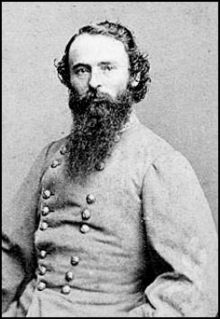James Fleming Fagan
James Fleming Fagan (born March 1, 1828 in Louisville , Kentucky , † September 1, 1893 in Little Rock , Arkansas ) was an American politician and major general of the Confederate States of America in the Civil War .
Life
At the age of ten, Fagan moved with his parents to Little Rock, Arkansas, where his father worked for the government. When he died a few years later, his mother married Samuel Adams , who became governor of Arkansas in 1844 . From 1846 to 1848 Fagan took part as a volunteer under General Archibald Yell in the Mexican-American War , after which he left the army as a lieutenant and returned to his homeland. After Adams' death in 1850, Fagan ran the family farm on the Saline River in southern Arkansas, engaged in politics, joined the Whigs, and represented Saline County for one term in Arkansas Parliament .
Civil War
When the Civil War broke out, Fagan signed up for the Confederate Army and became company commander. This company was later integrated into the 1st Arkansas Infantry Regiment and he himself was appointed commander of this 900-man regiment. The regiment was stationed at Lynchburg , Virginia . After the change of position to General Albert S. Johnston's western theater of war , it was part of the first wave of attacks at the Battle of Shiloh on April 6 and 7, 1862. A short time later, Fagan was involved in combat operations near Farmington , Mississippi , and on October 3rd and 4th of the same year in the Second Battle of Corinth . He was then transferred to the Trans-Mississippi Theater of War, where he took part with the 1st Arkansas Cavalry Regiment on November 28, 1862 at the Battle of Cane Hill and on December 7 at the Battle of Prairie Grove , both in Washington County , Arkansas.
On September 12, 1862, Fagan was promoted to brigadier general and was given command of a brigade that was formed from several regiments from Arkansas. In the following years he played an important role in the Battle of Helena on July 4, 1863 in Phillips County , Arkansas and in the defense of Little Rock. In 1864, Fagan took part in the March 10 to May 22 Red River campaign and was promoted to major general on May 24, 1864. On September 27, 1864, he took Fort Davidson after a brief battle and was then given command of the Arkansas District in the Trans-Mississippi Defense Area, which he held until the end of the war and until his capture.
Later career
On June 20, 1865, Fagan was released on parole and returned to his Arkansas farm. President Ulysses S. Grant named him United States Marshal for the western district of Arkansas in 1875 . This happened because he was supposed to master the prevailing crime along with Isaac Charles Parker , who was appointed federal judge for that district that same year. Fagan also received permission from Grant to appoint up to 200 Deputy United Marshals to take over police duties in Indian territory . Fagan held the office of United States Marshals until 1877. From 1877 he worked in a US office for land allocation under the Homestead Act , which was passed in 1862 by President Abraham Lincoln and was in force until 1976, in Alaska until 1986. In 1890 he ran unsuccessfully for the office of Arkansas Railroad Commissioner . Fagan died in Little Rock on September 1, 1893 and was buried in Mount Holly Cemetery .
The General James Fleming Fagan Camp # 280 of the organization Military Order of the Stars and Bars was named after him.
See also
literature
- David J. Eicher, The Civil War in Books: An Analytical Bibliography , University of Illinois, 1997, ISBN 0-252-02273-4 .
- Richard N. Current, Encyclopedia of the Confederacy (1993) (4 vol.) ( ISBN 0132759918 )
- John H. Eicher & David J. Eicher, Civil War High Commands , Stanford University Press, 2001, ISBN 0-8047-3641-3 .
- Ezra J. Warner, Generals in Gray: Lives of the Confederate Commanders , Louisiana State University Press, 1959, ISBN 0-8071-0823-5 .
Web links
- James Fleming Fagan in the database of Find a Grave (English)
| personal data | |
|---|---|
| SURNAME | Fagan, James Fleming |
| BRIEF DESCRIPTION | American politician and Confederate general in the Civil War |
| DATE OF BIRTH | March 1, 1828 |
| PLACE OF BIRTH | Louisville , Kentucky |
| DATE OF DEATH | September 1, 1893 |
| Place of death | Little Rock , Arkansas |
